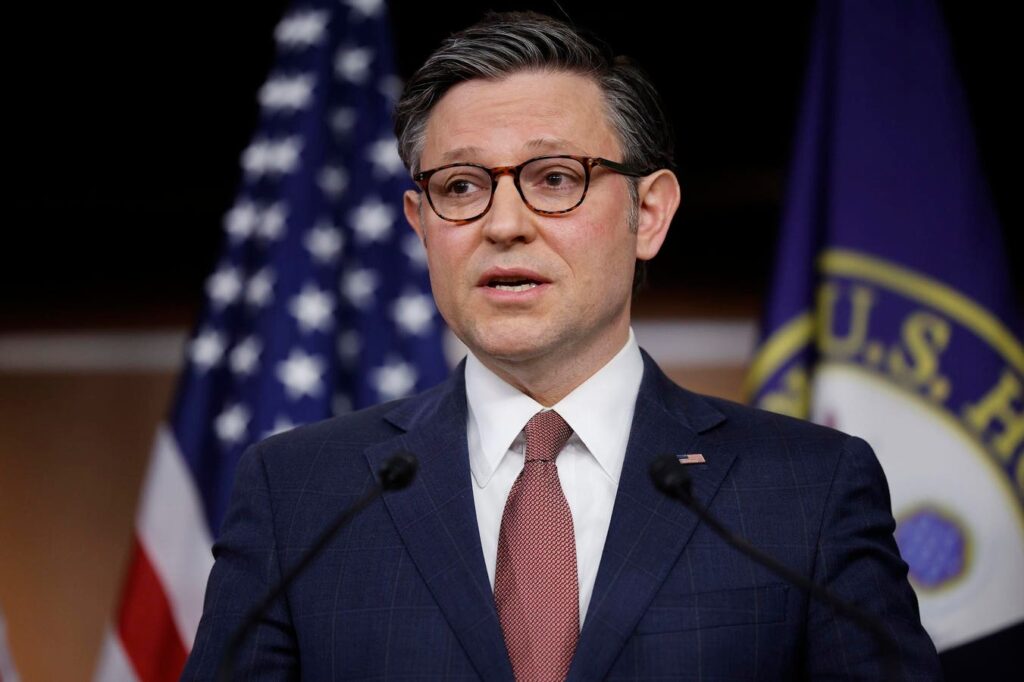WASHINGTON, DC – MARCH 20: Speaker of the House Mike Johnson (R-LA) speaks during a news conference. … [+]
This week, House Republican leadership is pushing for vote on its budget framework, which assumes $2.6 trillion in economic growth from tax cuts and unspecified deregulation, far more than conventional economic estimates suggest.
At the same time, key Senate leaders are endorsing the idea that tax cuts are not really tax cuts at all, and thus have no cost.
But don’t be fooled by the debate over current law versus current policy baselines, or by unfounded claims that tax cuts pay for themselves. No matter how Congress formally scores the price of extending the 2017 Tax Cuts and Jobs Act (TCJA), as well as other Trump initiatives, accounting legerdemain can’t make fiscal reality disappear.
In the end, Congress will have to pay for tax cuts and new spending by raising trillions of dollars in other taxes, cutting other spending, or by borrowing the money. And no scorekeeping tricks can change that.
A Tough Challenge
GOP lawmakers face a tough challenge. Extending the expiring provisions of the TCJA will cost in excess of $4 trillion over the next decade. Adding other tax cuts proposed by President Trump in his 2024 campaign, including tax-free tips, overtime, and Social Security benefits, could boost the price tag by as much as $11 trillion, according to the Committee for a Responsible Federal Budget.
But with narrow majorities in the House and Senate, and with deep divisions over how to pay for extending the TCJA, Hill Republicans are looking at ways to hide its staggering price tag.
House leaders have one solution: The Budget Committee’s fiscal framework assumes $2.6 trillion in deficit reduction as a result of economic growth, offsetting more than 60 percent of the cost of extending the TCJA. However, TPC estimates the economic benefit of the tax cuts would cover about 6 percent of their cost. Other analysts share that skepticism.
A Costless Extension
Senate Finance Committee Chair Mike Crapo (R-ID) is pushing another idea. He argues that there would be no cost to extending expiring provisions of the TCJA because Congress would merely be continuing existing tax cuts. Thus, letting people keep something they already have is not a new initiative, and should not be treated as costing anything.
This is a “current policy baseline” in budget-speak. It is highly unusual, though not unique. President Obama used a similar gimmick when he wanted to make extending some of the George W. Bush-era tax cuts look less costly than they really were.
But when it builds fiscal plans, Congress nearly always uses what it calls a current law baseline, which is what the budget laws themselves call for. The Congressional Budget Office and the Joint Committee on Taxation (as well as independent scorekeepers such as TPC) look at it this way: Once they end, the expiring provisions of the TCJA essentially will add nothing to the budget deficit. But extending them reduces revenue and adds to the federal deficit and debt.
Which accounting method is right?
A taxpayer may agree with Crapo. If I pay an effective tax rate of, say, 13 percent this year and Congress extends the law so I pay the same 13 percent next year, it looks like I got no additional benefit.
Of course I did, since I was scheduled to pay more in 2026. However it doesn’t look that way since my tax bill didn’t change.
But budget scoring is not about taxpayer perception. It is a tool for Congress to keep track of how its actions affect deficits and debt. And from that perspective, there is no serious argument.
Think of it this way: I borrow $100 from you for one year. At the end of the year, instead of paying you back, I ask you to let me keep the $100 for another year. From my perspective, nothing sems to be changing. But as the lender, not having that $100 at the end of the first year means you have less to live on.
Now look at it with much bigger numbers, as Congress must. In 2027, CBO expects the government will collect $5.68 trillion in tax revenue, assuming the expiring provisions of the TCJA come off the books in 2025 as scheduled, But if Congress chooses to extend the law, Treasury will collect $460 billion less. And as with your extended loan, that money will have to come from somewhere.
Bananas and Kumquats
Many years ago, economist Fred Kahn, at the time an advisor to President Carter, got in trouble for warning Congress that rising inflation could halt economic growth. After the White House banned Kahn from using words such as “depression” or even “recession,” he took to calling negative economic growth a “banana.” And when banana growers got mad, he called it a kumquat.
Behind Kahn’s humor was an important message: You can spin all you want, but in the end, you can’t ignore economic and financial reality.
Read the full article here
